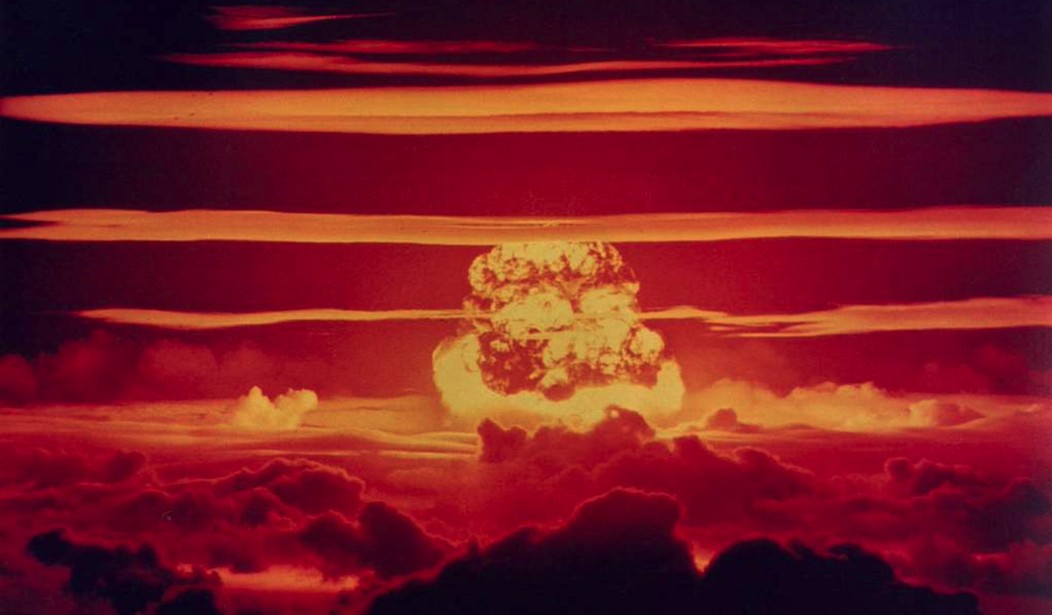Everything science-fiction sounds ridiculous, until it comes true — like a worldwide pandemic caused by a virus engineered through gain-of-function in a dingy communist lab.
As I masochistically listen to White House press briefings featuring the admitted diversity hire Karine Jean-Pierre and the sad nominal “journalist” cuckolds who constitute the “press corps,” I always get a fatalistic kick listening to her read her pre-written notecards on a topic light years beyond her comprehension as if that is supposed to assuage the concerns of the American public.
Related: KJP vs. English: White House Diversity Hire’s Reading Problem
Here she is discussing a “comprehensive process” to regulate existential concerns over AI.
No malarkey, Jack: We’re not in Kansas anymore, folks. And our leaders are buffoons leading us off of a digital cliff.
Via War on the Rocks (emphasis added):
For now, there is a broad consensus amongst nuclear experts and nuclear-armed states that, even if the technology permitted, AI decision-making that directly impacts nuclear command-and-control functions (i.e., missile-launch decisions), should not be pre-delegated to AIs. Whether this fragile consensus can withstand mounting first-mover advantage temptations in a multipolar nuclear order is less certain. Whether human commanders — predisposed to anthropomorphize subjects, cognitive offloading, and automation bias — can avoid the temptation to view AI as a panacea for the cognitive fallibilities of human decision-making is also unclear. The question, therefore, is perhaps less whether nuclear-armed states will adopt AI technology into the nuclear enterprise, but rather by whom, when, and to what degree.
Sounds awesome.
If countries were high school students, and we were doing the traditional superlatives thing, the People’s Republic of China would be voted “most likely to initiate world destruction by giving AI the nuclear keys.”
But don’t worry: the Brandon entity is large and in charge. It’s going to ensure the CCP behaves itself.
Via Nikkei Asia (emphasis added):
The Biden administration plans to encourage China to work with the U.S. on international norms for artificial intelligence in weapons systems, a potential new area of cooperation amid tensions between the two powers.
U.S. President Joe Biden's administration has warned against relying on AI to make decisions involving the use of nuclear weapons and argues that humans should be involved in all critical decisions."We've seen through history numerous examples of where decision-making could be challenged by not having a human understanding the context of the technology, understanding the background of its use, and really not being able to make the most informed decision," said Stewart, who suggested that maintaining human involvement in nuclear operations would be in China's best interest.
The issue of AI use with nuclear weapons would also require discussion with Russia, which continues with its war in Ukraine. Russia has suspended its participation in the last remaining bilateral nuclear arms control arrangement known as New START amid heightened tensions with the West.
It's also worth noting that nuclear weapons are perhaps the least of the existential concerns regarding AI technology and what techno-hell it might unleash on the world.
Via Foreign Affairs (emphasis added):
When drug researchers used AI to develop 40,000 potential biochemical weapons in less than six hours last year, they demonstrated how relatively simple AI systems can be easily adjusted to devastating effect. Sophisticated AI-powered cyberattacks could likewise go haywire, indiscriminately derailing critical systems that societies depend on, not unlike the infamous NotPetya attack, which Russia launched against Ukraine in 2017 but eventually infected computers across the globe. Despite these warning signs, AI technology continues to advance at breakneck speed, causing the safety risks to multiply faster than solutions can be created.










